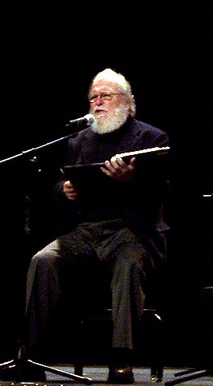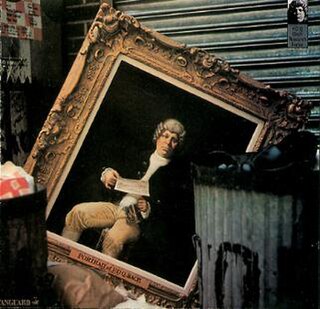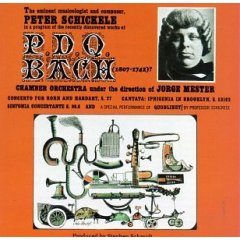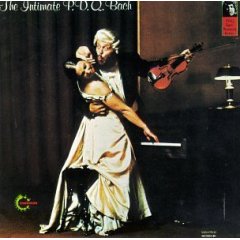
Johann Peter Schickele was an American composer, musical educator and parodist, best known for comedy albums featuring his music, which he presented as being composed by the fictional P.D.Q. Bach. He also hosted a long-running weekly radio program called Schickele Mix.

The serpent is a low-pitched early wind instrument in the brass family developed in the Renaissance era. It has a trombone-like mouthpiece, with tone holes and fingering like a woodwind instrument. It is named for its long, conical bore bent into a snakelike shape, and unlike most brass instruments is made from wood with an outer covering of leather. A distant ancestor of the tuba, the serpent is related to the cornett and was used for bass parts from the 17th to the early 19th centuries.
Sinfonia concertante is an orchestral work, normally in several movements, in which one or more solo instruments contrast with the full orchestra. It emerged as a musical form during the Classical period of Western music from the Baroque concerto grosso. Sinfonia concertante encompasses the symphony and the concerto genres, a concerto in that soloists are on prominent display, and a symphony in that the soloists are nonetheless discernibly a part of the total ensemble and not preeminent. Sinfonia concertante is the ancestor of the double and triple concerti of the Romantic period corresponding approximately to the 19th century.

Les Luthiers is an Argentine comedy-musical group, very popular also in several other Spanish-speaking countries including Paraguay, Guatemala, Peru, Chile, Ecuador, Spain, Colombia, Mexico, Uruguay, Bolivia, Cuba, Costa Rica and Venezuela. They were formed in 1967 by Gerardo Masana, during the height of a period of very intense choral music activity in Argentina's state universities. Their outstanding characteristic is the home-made musical instruments, some of them extremely sophisticated, which they skillfully employ in their recitals to produce music and texts full of high class and refined humor. From 1977 until his death in 2007, they worked with Roberto Fontanarrosa, a renowned Argentine cartoonist and writer.
The Concerto for Horn and Hardart, S. 27, is a work of Peter Schickele composing under the pseudonym P. D. Q. Bach. The work is a parody of the classical double concerto but where one instrument, the hardart, uses different devices, such as plucked strings, blown whistles and popped balloons, to produce each note in its range. The name "hardart" and the name of the concerto is a play on the name of proprietors Horn & Hardart, who pioneered the North American use of the automat. Like the automat, the hardart had small windows in the front where the musician had to insert coins to remove implements needed to strike or otherwise play the devices that produced the notes. The composer Philip Glass, a classmate of Schickele's, helped build the actual instrument; Glass and the others tasked with building the hardart made it a transposing instrument without telling Schickele, who had to transpose at sight during the performance. As with other works that Schickele attributed to P. D. Q. Bach, "beneath the satire one finds very sound technique and invention in the music."

Portrait of P. D. Q. Bach was released in 1977 on Vanguard Records. The album features mostly the work of Peter Schickele writing as P. D. Q. Bach, with one contribution under his own name.

The Ill-Conceived P. D. Q. Bach Anthology is a collection of works by Peter Schickele writing as P. D. Q. Bach originally recorded on the Telarc label by the composer.

Peter Schickele Presents an Evening with P. D. Q. Bach (1807–1742)? was the first concert of and the first release of the music of Peter Schickele under his comical pseudonym of P. D. Q. Bach by Vanguard Records. The chamber orchestra was conducted by Jorge Mester. The album consists of musical parodies with commentaries by the composer.

Music for an Awful Lot of Winds and Percussion was released in 1992 by Telarc Records. The album contains one piece by Professor Peter Schickele writing under his own name and several pieces by him as P. D. Q. Bach.

An Hysteric Return: P.D.Q. Bach at Carnegie Hall is live recording of a P. D. Q. Bach concert in Carnegie Hall and was released on Vanguard Records in 1966.

The Intimate P. D. Q. Bach is "a live recording of The Intimate P.D.Q. Bach stage show, featuring Professor Peter Schickele and the Semi-Pro Musica Antiqua" and was released on Vanguard Records in 1973. Many of the performer credits are humorous, and as with all P.D.Q. Bach recordings, the "S" numbers are fictitious and humorous. The cover art is a parody of the 1901 painting Kreutzer Sonata by René-Xavier Prinet.

A Little Nightmare Music is an opera in "one irrevocable act" by Peter Schickele under the pseudonym he uses for parodies and comical works P. D. Q. Bach. The title of the work refers to the English translation of Mozart's famous Eine kleine Nachtmusik. The opera is described as being "based on a dream he had December 4, 1791, the night that Wolfgang Amadeus Mozart died and Antonio Salieri didn't." The opera was "newly exhumed" at Carnegie Hall on December 27, 1982. It was later recorded with the premiere cast and released on CD by Vanguard Records in 1983. The album also includes two other works by P. D. Q. Bach: an octet and a parody of Handel's Water Music and Music for the Royal Fireworks, Royal Firewater Musick.

Oedipus Tex and Other Choral Calamities was released in 1990 by Telarc Records. The album contains works by Peter Schickele under his alter-ego of P. D. Q. Bach and won a 1990 Grammy Award for 'Best Comedy Performance'.

Two Pianos Are Better Than One was released in 1994 by Telarc Records. The album contains works by Peter Schickele, sometimes under the pseudonym P. D. Q. Bach, including the "Concerto for Two Pianos vs. Orchestra, and three other works that don't require even one piano."

The Wurst of P. D. Q. Bach is a collection of works by Peter Schickele under his comic pseudonym of P. D. Q. Bach originally recorded on the Vanguard Records label by the composer. It includes "lowlights" from four different Vanguard albums: Peter Schickele Presents an Evening with P. D. Q. Bach (1807–1742)?, An Hysteric Return: P.D.Q. Bach at Carnegie Hall, Report from Hoople: P. D. Q. Bach on the Air, and P. D. Q. Bach's half-act opera The Stoned Guest. Wurst is the German word for sausage, with the album cover photograph set in a sausage shop.

The Dreaded P. D. Q. Bach Collection is a collection of works by Peter Schickele under the pseudonym of P. D. Q. Bach originally recorded on the Vanguard Records label by the composer. It includes the complete contents of the first five P. D. Q. Bach albums, plus the never-before-released "Sanka" Cantata.

P.D.Q. Bach in Houston: We Have a Problem! is a live performance celebrating 40 years of P. D. Q. Bach. This performance features Professor Peter Schickele with Orchestra X conducted by Peter Jacoby. It includes never-before-recorded performances of "Trumpet Involuntary" movement of Iphigenia in Brooklyn, and also the rounds Odden und Enden.

The Definitive Biography of P.D.Q. Bach (1807–1742)? is a book by Prof. Peter Schickele chronicling the life of fictitious composer P. D. Q. Bach.
The Echo Sonata for Two Unfriendly Groups of Instruments is a satirical instrumental work written by Peter Schickele under the pseudonym of P.D.Q. Bach, whom Schickele studies as a "scholar".


















